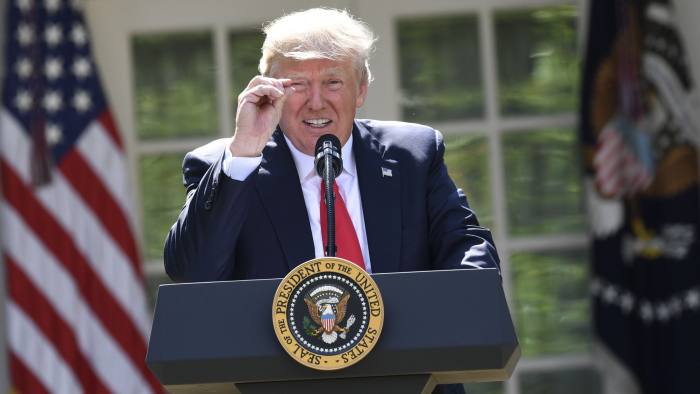Business needs to show there is more to the US than Donald Trump
The world will watch to see if words and deeds prove an irrevocable change in approach
by: Lawrence Summers

In economics as in life things often take longer to happen than you think they will and then happen faster than you thought they could. So it may turn out with the catastrophic international economic policies of President Donald Trump. It is possible that the past week will be remembered as a hinge in history — a moment when the US and world started moving on a path away from the peace, prosperity and stability that have defined the past 75 years.
For all that has gone wrong in the past 75 years, they have witnessed more human betterment than at any time in human history. The rate of fatalities in war has steadily declined even as growing integration has driven global growth and improvement in life expectancy and living standards.
Progress is too slow and not well enough shared but Americans have never lived so well. This has been driven by remarkable developments in human thought especially in science and technology and a relatively stable global order that has been underwritten by the US.
Will these trends continue? Optimists have suggested that despite the revanchist and often anti-rationalist rhetoric of his campaign, Mr Trump has in the international sphere surrounded himself with rational establishment advisers and has either retreated or been stymied by Congress on proposals like launching trade wars or building walls.
Until last week, they had a reasonable argument. No longer. We may have our first post-rational president. Mr Trump has rejected the view of modern science on global climate change, has embraced economic forecasts and trade theories outside the range of reputable opinion, and relied on the idea of alternative facts rather than evidence-based truth.
Even for Conservative statesmen like Ronald Reagan, George W Bush and Henry Kissinger the idea of a community of nations has been a commonplace. Now HR McMaster, national security adviser, and Gary Cohn, director of the national economic council, who have been held out as the president’s most rational globally minded advisers have now taken to the Wall Street Journal to proclaim that “the world is not a global community”.
They advance a theory of international relations not unlike the one that animated the British and French at Versailles. The objective of international negotiation is not to establish a stable peaceful system or to seek co-operation or to advance universal values through compromise but to strike better deals in “an arena where nations, non-governmental organisations, and businesses compete for advantage”.
In service of this theory, the president last week renounced any claim to American moral leadership by failing to convincingly reaffirm traditional US security commitments to Nato and abandoning participation in the Paris global climate agreement. The latter is probably our most consequential error since the Iraq War and may well be felt over an even longer term.
There will be consequences to all of this as there were to the pursuit of short term advantage rather than systemic stability at Versailles. One does not need to subscribe to pessimistic versions of Graham Allison’s Thucydides Trap about the perils associated with a rising power to worry about Chinese efforts to fill the vacuum left by the US.
How, after the events of the last week, can America’s adversaries and allies alike not follow Angela Merkel, German chancellor, in concluding that the US is now far less predictable and reliable? How can the responses be other than destabilising?
It is essential that leaders in American society signal clearly their disapproval of the course the administration is taking. History will judge poorly business leaders who retain their positions on Trump administration advisory boards in the hope of being in a position to cut favourable deals. Elon Musk of Tesla and Robert Iger of Disney have taken the right and principled stand by resigning their presidential appointments. More should follow.
What is to be done? The US president is not America. The world will be watching to see whether President Trump’s words and deeds represent an irrevocable turn in America’s approach to the world or whether they represent a temporary aberration.
The more that leading figures in American society can signal their continuing commitment to reason, to common purpose with other nations, and to addressing global challenges the more the damage can be contained. And of course the Congress has a central role to play in preventing dangerous and destabilising steps.
The writer is Charles W Eliot university professor at Harvard and a former US Treasury secretary
0 comments:
Publicar un comentario